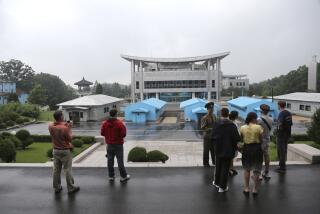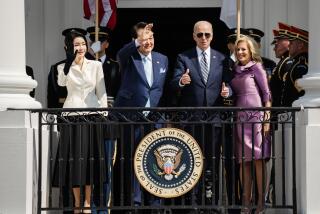‘Concerned’ U.S. Urges Seoul to Meet Protests With Restraint, Talks
- Share via
WASHINGTON — President Reagan’s spokesman said Friday that the Administration has urged the South Korean government to handle violent protests with restraint and to resume talks with the political opposition.
Reagan, in brief remarks at a photo session with the president of Chad, said that “we’re very concerned” about the violence in South Korea. But he refused to comment on a published report that he had written to President Chun Doo Hwan, counseling against overreaction.
“I’m not going into any details of what we might have done or not done,” Reagan said.
However, White House spokesman Marlin Fitzwater said in a statement that the South Koreans have been informed through “a variety of channels” that they should “continue a dialogue with the opposition on constitutional reform” and should “use caution and restraint in dealing with the violent protests.”
Legislation Opposed
Fitzwater expressed opposition to legislation introduced Thursday by lawmakers, led by Sen. Edward M. Kennedy (D-Mass.), that would impose trade sanctions on South Korea in an effort to force its leaders to accept democratic reforms.
“We feel that this situation is very complicated and trade sanctions are very complicated, and this is not the right place or time to be mixing the two together,” Fitzwater said. State Department spokeswoman Phyllis Oakley added that sanctions would be “unwise and not helpful.”
Kennedy, accusing the Administration of applying too little pressure on the South Korean government, said he will seek to attach the sanctions to a trade bill coming before the Senate next week.
“Now is the time for transition from dictatorship to democracy,” Kennedy said. “Unless the government of Korea implements reforms, increased instability, violence and even bloodshed are likely, and the (1988) Olympic Games will be in jeopardy.”
Americans Cautioned
Meanwhile, the State Department cautioned Americans in riot-torn South Korea to avoid large cities and demonstrations but stopped short of warning against travel to the country as a whole. This travel advisory will remain in effect until July 31, the State Department’s bureau of consular affairs said.
Oakley denied that the department issued the advisory because the Administration believes that the Chun Doo Hwan government is unable to maintain order. “It should not be read in any political way,” she said.
Oakley said that she was unaware of any discussion within the Administration of suspending arms sales to South Korea. This has been the traditional diplomatic instrument used in cases of human rights abuse, and the Chun regime is a major buyer of U.S. military equipment.
Although the Administration has refrained from anything but the mildest reproach to the South Korean government, State Department officials have insisted privately that quiet diplomacy is being pursued, citing a U.S. plea for the regime to let besieged dissenters leave Seoul’s Roman Catholic cathedral quietly last weekend.
Speculation Shunned
Asked Friday if the spreading disorder would prompt more active peace-making efforts, such as a public offer of good offices, Oakley replied: “I’m not going to speculate on various things that we might do.”
Fitzwater said the Administration sees no parallel between the situation in South Korea and the one in the Philippines last year that led to the overthrow of President Ferdinand E. Marcos.
“They’re just not similar--different political situations, different economic situations, different U.S. interests on almost every point,” he said.
More to Read
Sign up for Essential California
The most important California stories and recommendations in your inbox every morning.
You may occasionally receive promotional content from the Los Angeles Times.













